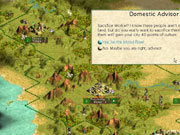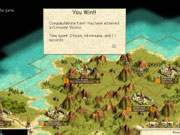It's almost hard to believe that Civilization III is already two years old. When it debuted in 2001, the third game in what's arguably the greatest strategy series of all time for the most part lived up to fans' high expectations. However, the franchise stumbled badly with the subsequent expansion pack, Civilization III: Play the World, because its biggest and most anticipated feature, a multiplayer component, was broken, bug-ridden, and virtually unplayable out of the box. A slow succession of patches over the past year addressed most of the problems, though the damage was done and Play the World remains a forgettable afterthought in the otherwise glorious annals of Civ. You've got to hand it to Firaxis, though, because the company took its lumps, went back to the drawing board, and came up with Civilization III: Conquests, a great expansion pack that reinvigorates a gaming classic while finally delivering on the multiplayer promised long ago.

Conquests derives its name from the fact that the centerpieces of this expansion are nine meticulously crafted scenarios built around important moments in history, from the dawn of civilization in Mesopotamia all the way up to the Pacific theater of operations in World War II. In essence, the designers chopped up the epic game, which takes you from the Stone Age to Alpha Centauri, into nine distinct eras, then expanded upon them so we get nine mini-Civilization games that aren't so "mini" at all.
The designers did a great job of selecting scenarios that present distinctly different challenges and approaches and that also inject some much-needed diversification in the strategy genre. There are the obligatory European-based scenarios, but there's also an engaging Mesoamerican campaign, as well as a challenging Age of Discovery scenario set in the New World that, in a nice twist, also lets you play as the indigenous civilizations trying to stave off European colonization. Some scenarios, like the Japanese-based Sengoku campaign, will feel familiar because you have to build an empire from scratch. Others, like Napoleonic Europe, begin with all the major players having already been established and the map fully revealed, so instead of empire building, it's all about making (and breaking) alliances and engaging in grand military campaigns. Since each scenario has specific victory goals and turn limits, they force you to play a much more aggressive game than you might normally play in a regular Civ game.

Each scenario packs an impressive amount of historical detail, along with a clever tailoring of the rules, technology trees, units, and artwork. For example, during the Mesoamerican campaign you'll battle it out as the Inca, Aztecs, or Mayans for control of Central and South America. Since ritual human sacrifice was a critical part of those societies, your warriors can capture units in battle, and you can sacrifice those units at one of your cities to boost your culture points and expand your empire's boundaries and influence! And since these civilizations thrived in the jungles and mountains, the rules have been rewritten to allow you to build cities on mountaintops, like the legendary lost cities of South America, as well as treat jungle squares as grassland in terms of productivity. It's a treat when you realize that, for once, jungles are your friend instead of a tedious obstacle. The tech tree has also been reworked and features numerous Mesoamerican-specific technologies, and there are a whole slew of strategic and luxury resources associated with South America that you must seize if your empire is to thrive, including exotic birds, tobacco, and even llamas! The level of detail is so amazing, and the material is so new and fresh, that you'll often find yourself actually reading the entries in the Civolopedia to learn more about these ancient societies.
In addition to featuring new scenarios, Conquests offers an overhauled version of the regular epic campaign. It's hard to believe that Civilization could get any better, but it has. There are, of course, the requisite number of new civilizations, new technologies, and new Wonders of the World to build (many of which were lifted from the scenarios), but there are literally dozens of other enhancements and improvements. On top of that, Firaxis took some of the knowledge gleaned from the millions of collective hours of Civ III that have been played and has rebalanced the game, tweaking many of the existing technologies and government types, as well as subtly reworking the technology tree. The artificial intelligence has also been improved with the addition of two new difficulty levels to challenge the most ruthless Civ pros, but even on the lesser difficulty levels, the AI seems to play a bit smarter.

For those looking for a human opponent, the long and controversial saga of Civilization III multiplayer has finally come to an end. To recap: Multiplayer was originally promised as part of the original game but was removed at the last moment. It then debuted as a broken component in the Play the World expansion (which is included with Conquests, so you don't need to buy it separately). Well, it took two years, but multiplayer is now playable in a reliable manner...sort of. We did have a few problems, as multiplayer kept crashing on one machine, but once it was up and running, it stayed up and running. That is, until all the other players took off early, which is why we're not convinced that multiplayer Civilization is all that it's made out to be. To enjoy multiplayer Civ, you need a reliable group willing to invest the amount of time required. Even with simultaneous movement turned on, it's a slow-paced game, and there's nothing more frustrating than playing online, only to watch your opponents ditch in the middle of the game.
Civilization was never known for cutting-edge graphics, but we loved the artistic style and design of Civ III when it arrived. Conquests doesn't feature any graphical improvements, and the game looks exactly like it did two years ago. We still like the parchment-like look and feel of the game, though we wish we could have the ability to run it in resolutions other than 1024x768. Conquests includes some new sound effects and musical tracks that add a nice level of ambiance, especially since each scenario has its own appropriate theme.
Aside from the aforementioned crash we experienced with multiplayer, Conquests was stable and relatively bug-free, although we did catch some glaring grammatical errors as well as a bug in the tax system, which caused us to accumulate gold even when we were supposed to be hemorrhaging it. But given Firaxis' two-year history of support for Civilization III and Play the World, we feel comfortable that these problems should get patched relatively quickly.

If you liked Civ III, you need to forget all about the bad experience Play the World may have given you and go out and buy Conquests. Between its entertaining and engaging scenarios, the improvements and enhancements to the regular epic game, and the functional multiplayer, it's the expansion pack that Play the World should have been, and much, much more. Our only regret is that it took two years for Firaxis to deliver it.